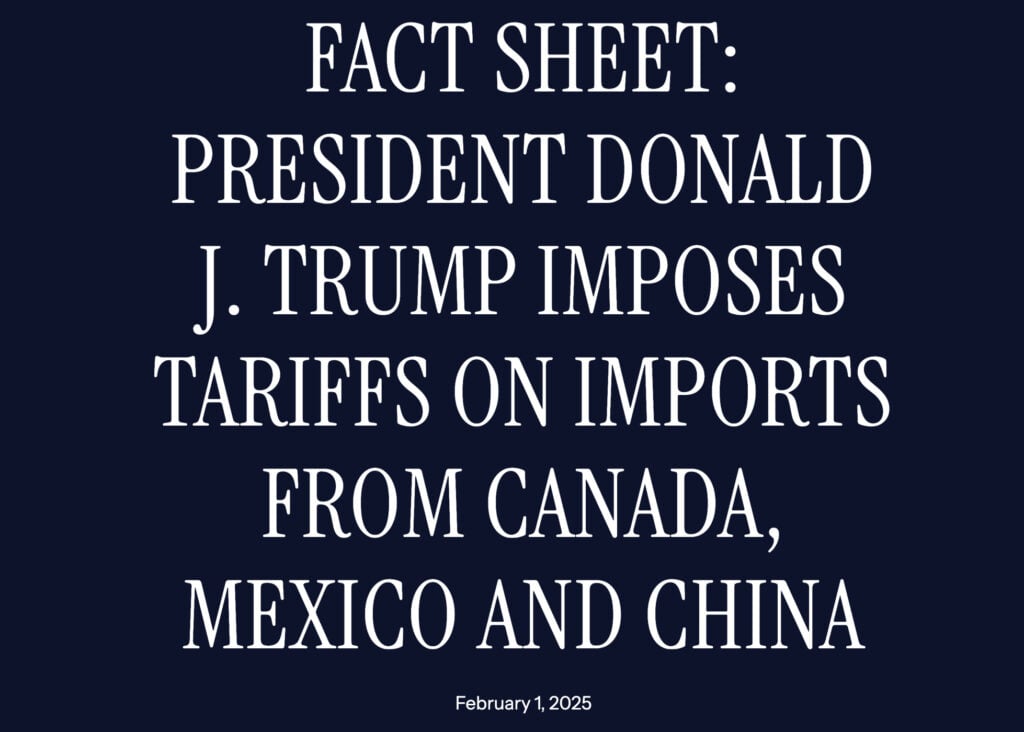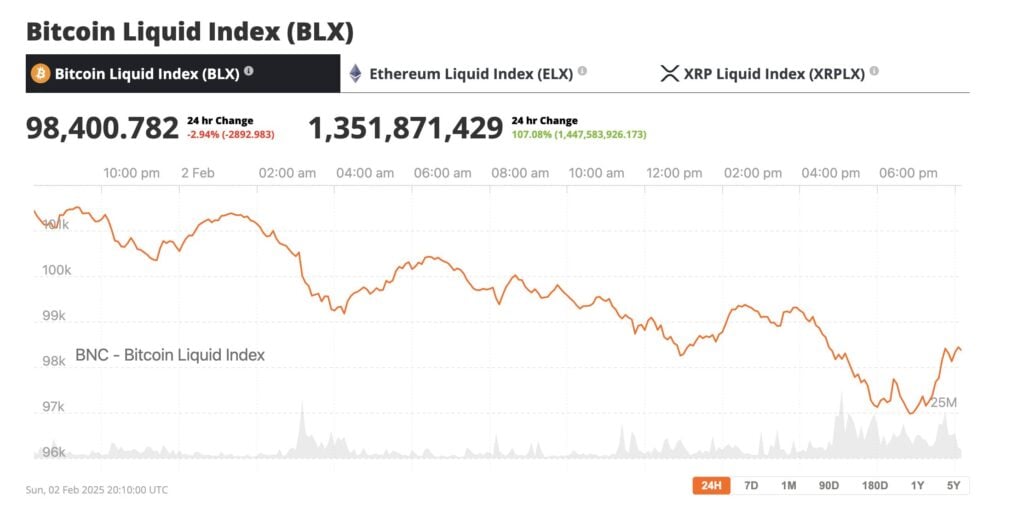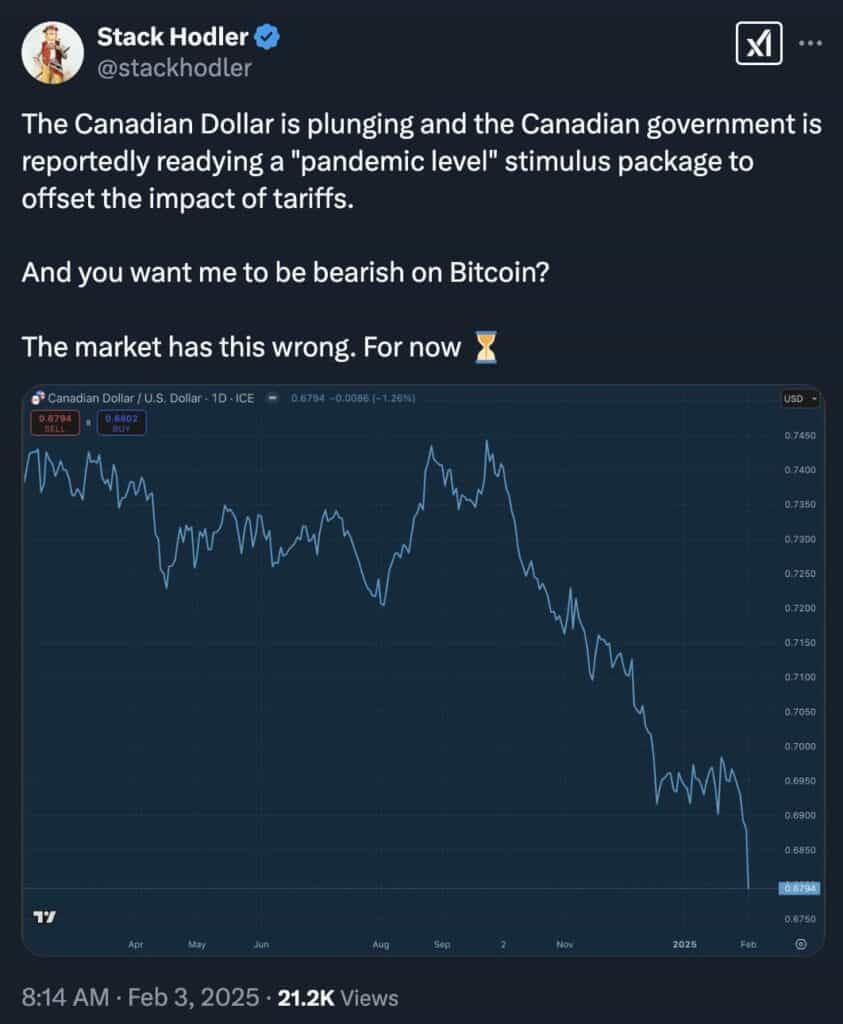On February 1, 2025, President Donald J. Trump announced the imposition of recent tariffs geared toward addressing nationwide safety issues associated to unlawful immigration and the inflow of illicit medicine, notably fentanyl. The measures embrace a 25% tariff on imports from Canada and Mexico, with a lowered 10% tariff particularly on Canadian vitality sources. Imports from China will face a 10% tariff.

Trump Tariffs goal China, Canada and Mexico, supply: White House
The administration justifies these tariffs by citing the failure of Mexico, Canada, and China to meet their commitments to halt unlawful immigration and forestall the stream of harmful medicine into the USA. The orders spotlight the position of Chinese language officers in not adequately controlling the export of precursor chemical compounds utilized in drug manufacturing and accuse Mexican drug trafficking organizations of getting an “insupportable alliance” with the Mexican authorities, facilitating the manufacturing and transport of narcotics. Moreover, there may be concern over the rising presence of Mexican cartels working drug synthesis labs in Canada.
These actions are taken underneath the authority of the Worldwide Emergency Financial Powers Act (IEEPA), declaring the scenario a nationwide emergency. The administration emphasizes that entry to the American market is a privilege and that tariffs are a strong device to guard nationwide pursuits. The assertion criticizes earlier administrations for not leveraging America’s financial place to safe borders and fight drug trafficking successfully.
In response, each Canada and Mexico have introduced plans to implement retaliatory tariffs on U.S. items, signaling the onset of a commerce battle among the many neighboring nations. An early signal of issues to come back is the autumn of the Canadian greenback towards the USD.
The Finish of American Hegemony: A Shift In the direction of a Multipolar World
The US is present process a seismic shift in its international technique, signaling the top of its period because the indispensable nation and embracing a brand new multipolar world order. This transition is marked by:
- Dismantling its international affect equipment, together with establishments like USAID.
- Marco Rubio overtly acknowledging that the U.S. is not the only real international energy, stating that the post-WWII international order is now out of date and getting used towards American pursuits.
- Imposing tariffs on allies like Mexico, Canada, and the EU, redefining alliances from a vassal-client mannequin to interest-based negotiations.
A Managed Retreat, Not a Collapse
Whereas this shift seems chaotic—particularly to those that nonetheless imagine in American primacy—it’s doubtless a strategic alternative somewhat than a compelled retreat. The U.S. was all the time going to lose its international dominance ultimately; as an alternative of ready for an inevitable collapse, it’s selecting to step again by itself phrases.
This doesn’t imply America is withdrawing from the world—it might, in truth, turn into much more aggressive. The distinction is that it not has to take care of the phantasm of a “rules-based order” or play good with allies. With out the burden of worldwide stewardship, American international coverage might turn into much more transactional and disruptive.
Maybe the most important losers on this shift are America’s conventional allies, who are actually caught off guard because the U.S. stops treating them as protected companions and begins negotiating with them as equals. This marks some of the vital transformations in international politics for the reason that fall of the Soviet Union.
Why Trump’s Tariffs Are Good for the U.S. Economic system
For years, Chinese language fast-fashion giants like Temu, SHEIN, and AliExpress have loved an unfair commerce benefit, flooding the U.S. market with low cost, typically low-quality merchandise whereas dodging import duties that American corporations are required to pay.
The rationale? A obvious loophole in U.S. commerce legislation often known as the “de minimis” rule—a decades-old regulation that enables any package deal valued underneath $800 to enter the nation duty-free, tax-free, and largely uninspected. This rule, initially designed for small private imports in an period earlier than international e-commerce, has been ruthlessly exploited by Chinese language corporations to ship billions of {dollars}’ value of products on to American customers with none oversight.
The numbers are staggering:
- In 2023, over 1 billion packages from China entered the U.S. underneath this loophole.
- Temu, SHEIN, and different direct-from-China platforms paid $zero in import duties, whereas American retailers like GAP and H&M paid tons of of hundreds of thousands.
- U.S. Customs and Border Safety (CBP) is overwhelmed, unable to correctly examine shipments, permitting counterfeit items, merchandise made with compelled labor, and even chemical compounds utilized in fentanyl manufacturing to slide by way of.
This isn’t “free commerce.” It is a backdoor for sponsored international competitors to undermine U.S. companies.
How It Works—and Why It’s Been So Abused
Chinese language sellers have gamed the system in two main methods:
- Breaking apart massive shipments into 1000’s of particular person packages to remain underneath the $800 threshold.
- Utilizing U.S.-based logistics companions to obtain bulk shipments, then break up them up and re-mail them as de minimis parcels, additional evading duties and inspections.
This scheme has allowed China to bypass tariffs, keep away from scrutiny, and dump artificially low cost items into the U.S. market, undercutting home companies that truly should pay taxes, observe laws, and adjust to labor legal guidelines.
It’s additionally been a nationwide safety danger: Shipments coming into by way of the de minimis loophole have been recognized as a key channel for smuggling fentanyl precursors into the U.S. By skipping normal customs entry, these shipments largely keep away from detection, making enforcement almost unimaginable.
The Loophole Is Lastly Closing
On Tuesday, De minimus entries from China can be shut down for good. With the brand new Trump tariffs shutting down this exploit for Chinese language items, the influence can be large:
✅ U.S. retailers will not face unfair competitors from corporations that evade duties and flood the market with ultra-cheap, low-quality merchandise.
✅ Extra merchandise must undergo correct customs inspections, making it more durable for counterfeit items, compelled labor merchandise, and illicit substances to slide by way of.
✅ China’s vertically sponsored logistics and manufacturing dominance takes a success, leveling the enjoying subject for U.S. producers who’ve lengthy struggled to compete towards artificially low costs.
This is among the largest victories for American companies and commerce equity in years.
For too lengthy, Chinese language exporters and complicit U.S. importers have discovered methods to bypass U.S. commerce guidelines—not simply by way of the de minimis rule, however by way of a spread of shady ways together with export sanction violations, customs fraud, and international commerce zone abuse. The brand new tariffs are lastly placing an finish to those backdoor schemes.
There have been huge holes in international logistics resulting in weaker American financial safety and home business. It is a long-overdue correction to a damaged system by a courageous new President ready to take some quick time period ache for long run achieve.
Why Bitcoin Is the One Commerce to Rule Them All
Jeff Park, Head of Alpha Methods at Bitwise wrote on X that Bitcoin is his highest conviction macro commerce for the 12 months. Park says Plaza Accord 2.zero is coming and the monetary conflict will ship Bitcoin violently larger.
Park says that to really grasp tariffs in at this time’s world, it is advisable body the dialog in two key contexts: 1) the continuing curse of the Triffin dilemma, and a couple of) Trump’s private monetary incentives. When you analyze each, the inevitable conclusion turns into clear: tariffs could also be a short lived mechanism, however the everlasting final result is that this—Bitcoin isn’t simply going up, it’s accelerating.
The Triffin Dilemma and Tariffs
First, the Triffin dilemma: As the worldwide reserve foreign money, the U.S. greenback enjoys what’s often known as “exorbitant privilege”, however this comes with unavoidable trade-offs:
The greenback is artificially overvalued as a result of international reserves should maintain it in a price-inelastic method.
The U.S. should run persistent commerce deficits to produce the world with these {dollars}.
The U.S. authorities enjoys low cost borrowing that it in any other case wouldn’t have entry to.
The U.S. desires to maintain low cost borrowing (#3) whereas someway escaping the constraints of an overvalued greenback (#1) and chronic commerce deficits (#2). The answer? Tariffs.
Tariffs aren’t simply protectionism—they’re leverage in international monetary warfare. They function a short-term negotiating weapon to push for a broader, coordinated realignment: a contemporary Plaza Accord. The aim? Power nations to dump greenback reserves and lengthen their U.S. Treasury holdings additional out on the curve. In different phrases, Trump is maneuvering to tug off a “YCC, not YCC” play—a de facto type of yield curve management without having the Fed’s formal intervention.
And that is the place Scott Bessent comes in. He understands that Yellen has left behind a fiscal catastrophe, doubling the proportion of debt financing through T-bills—injecting pretend liquidity into the system whereas leaving the U.S. on the mercy of short-term refinancing simply as charges have been spiking. The top outcome? A catastrophic mismanagement of length danger that may value U.S. taxpayers dearly.
Thus, the true endgame is the holy grail of fiat: a weaker greenback and decrease yields—a near-impossible feat that tariffs are supposed to assist engineer.
Trump’s Private Play: Actual Property and the 10-Yr Yield
Now, the second pillar: Trump’s motivations. His #1 precedence is to drive down the 10-year yield as a result of his personal empire is dependent upon it—actual property.
His preliminary obsession with Powell chopping short-term charges proved ineffective, main him to a brand new technique. Trump is bluntly profit-driven—which makes his actions predictable. By no means underestimate the ability of a self-interested billionaire with direct coverage affect. A method or one other, the 10-year yield is coming down.
The Asset to Personal: Bitcoin
That is why Park says that Bitcoin is the commerce of the last decade. In a world the place the greenback weakens and U.S. yields drop—one thing mainstream analysts will let you know is unimaginable as a result of they essentially misunderstand statecraft—danger property within the U.S. will go parabolic.
However right here’s the kicker: the price of tariffs—most certainly by way of inflation—can be borne by each the U.S. and its buying and selling companions. Nonetheless, the relative influence will cripple international economies extra. These nations can be compelled to counteract financial slowdowns with aggressive financial and financial stimulus, finally devaluing their very own currencies.
Residents in these nations—affected by depreciating fiat and potential monetary crises—will flip to alternate options. And in contrast to the 1970s, when there was no digital escape hatch, at this time Bitcoin exists.
So, whereas each side of the commerce conflict will search Bitcoin for various causes, the end result is similar: larger costs, violently quicker—as a result of that is monetary warfare.

Bitcoin dumped underneath $100,000 however might recuperate if Park’s thesis performs out, supply: Bitcoin Liquid Index
As Stockholder wrote on X, The Canadian Greenback is plunging and the Canadian authorities is reportedly readying a “pandemic degree” stimulus package deal to offset the influence of tariffs. And also you need me to be bearish on Bitcoin? The market has this improper. For now.

This might be a massively bullish arrange for Bitcoin, as Stockholder wrote on X.
Troy Miller Troy Miller Read More









